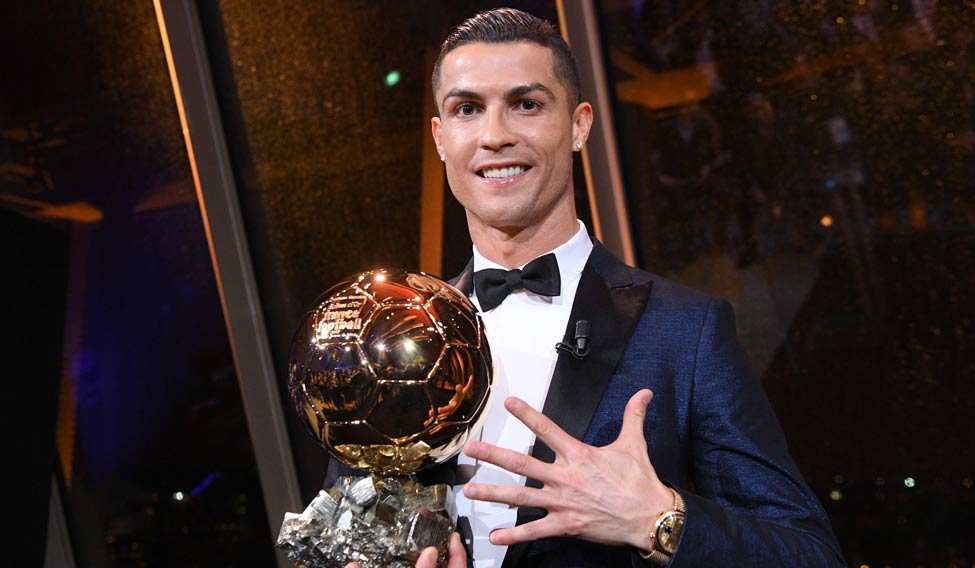When it comes to football, I am a stickler for accuracy. And, therefore, I have a huge problem with the ENTIRE WORLD saying that when Cristiano Ronaldo won the 2017 Ballon d'Or in Paris on December 7, he drew level with Lionel Messi on five Ballon d'Or awards. Why? Because Messi has won only one Ballon d'Or in his career—in 2009. That year, he also won the FIFA World Player of the Year award thus becoming the last player to win it under that name. Because the award which was started in 1991 was discontinued after 2009 and FIFA, for reasons best known to it, decided to merge it with the hugely popular Ballon d'Or which was started by France Football magazine in 1956.
Messi went on to win three consecutive FIFA Ballon d'Or awards from 2010 to 2012 and added a fourth in 2015 (no prizes for guessing that Ronaldo won the two in between). Then, in 2016, FIFA and France Football parted ways. Ballon d'Or moved on without a backward glance. Ronaldo won two more to add to the Ballon d'Or he had won in 2008. Meanwhile, the FIFA came up with the ridiculously named The Best FIFA Men's Player (there's also The Best FIFA Women's Player), which Ronaldo won in 2016 and this year.
So, technically, Ronaldo has three Ballon d'Or awards and Messi has one. Messi has five FIFA awards (2009, 2010, 2011, 2012 and 2015), the same as Cristiano Ronaldo (2008, 2013, 2014, 2016 and 2017). Football fans have told me that it is just a technicality and media all over the world seem to comfortable reporting they have five Ballon d'Or awards each.
But a little bit of relatively recent and well-documented history may help us to understand why these two awards are different and should be treated as such. From 1956 to 1994 the Ballon d'Or was given to the best European player. This meant that the likes of Pele, Garrincha and Diego Maradona, among many others, were not eligible for it. FIFA finally started its award for the best player in the world, not Europe, in 1991. Germany's defensive midfielder Lothar Matthaus was adjudged the best player in the world followed by French striker Jean-Pierre Papin. But the Ballon d'Or went to Papin. So, the world's best player Matthaus was only second best in Europe.
The reason for this, and the reason the awards are different are that FIFA's award is based on voting by national team coaches and captains, and selected media representatives. France Football's award is based on voting by selected international journalists only. And while the credentials of these ace journalists cannot be questioned (having closely observed many great players over the years, they may be more qualified to judge than current players), it has to be conceded that FIFA's methodology is more comprehensive.
In the first three years after its inception, the FIFA award went to European players. But in 1994, after Brazil won the first World Cup since the introduction of the award, Romario was adjudged the best player in the world. His Barcelona teammate, Hristo Stoichkov of Hungary, was second in FIFA's list and won the Ballon d'Or. France Football sensed an opportunity to expand as many non-European players were becoming household names in Europe. The next year it said that all footballers playing for European clubs will be eligible. Liberian striker George Weah, who was then with AC Milan, won, and in the next 11 editions, non-European players (read Ronaldo, Rivaldo and Ronaldinho) won the Ballon d'Or six times.
In 2007, the Ballon d'Or became an award for the world's best player for the first time in its history and non-European players with clubs outside Europe were nominated. After three editions, they struck a deal with FIFA and votes of coaches and captains were considered for the FIFA Ballon d'Or. After its 'divorce' with FIFA, France Football has gone back to its original method of considering the opinion of only sports journalists.
Therefore, the 2007 to 2009 and the 2016 and 2017 editions of the Ballon d'Or was the award given to the world's best football player by a panel of journalists. The FIFA awards—including the FIFA Ballon d'Or—from 1991 to 2017 were adjudged using a different methodology and a different sample size of experts. While France Football may not mind mixing up the two, it would be unmindful of the players who make football “the beautiful game”. If you still have doubts, just ask yourself which award you would want more if you were a top footballer—the one given by a French magazine or the one given by the world governing body?






